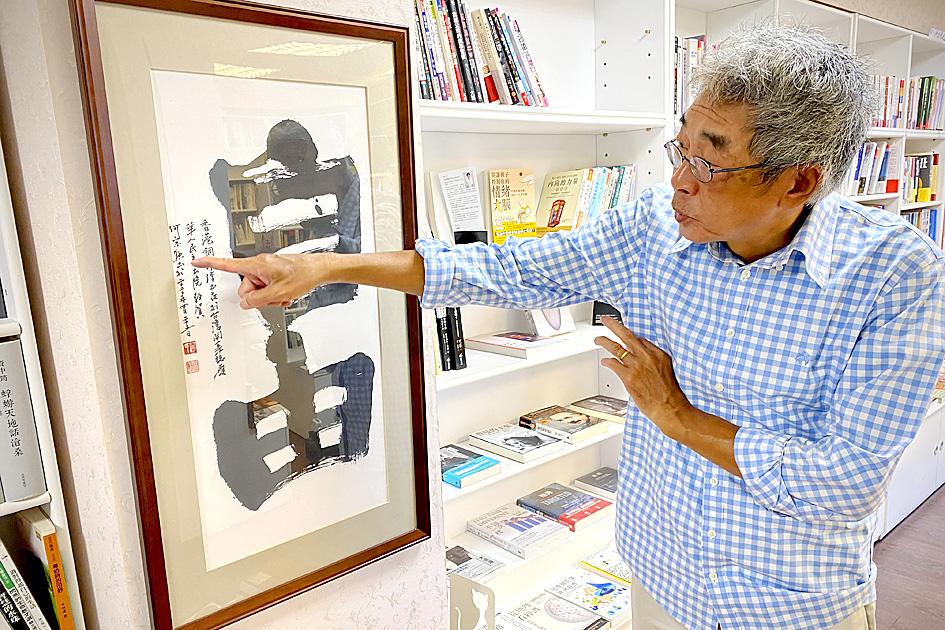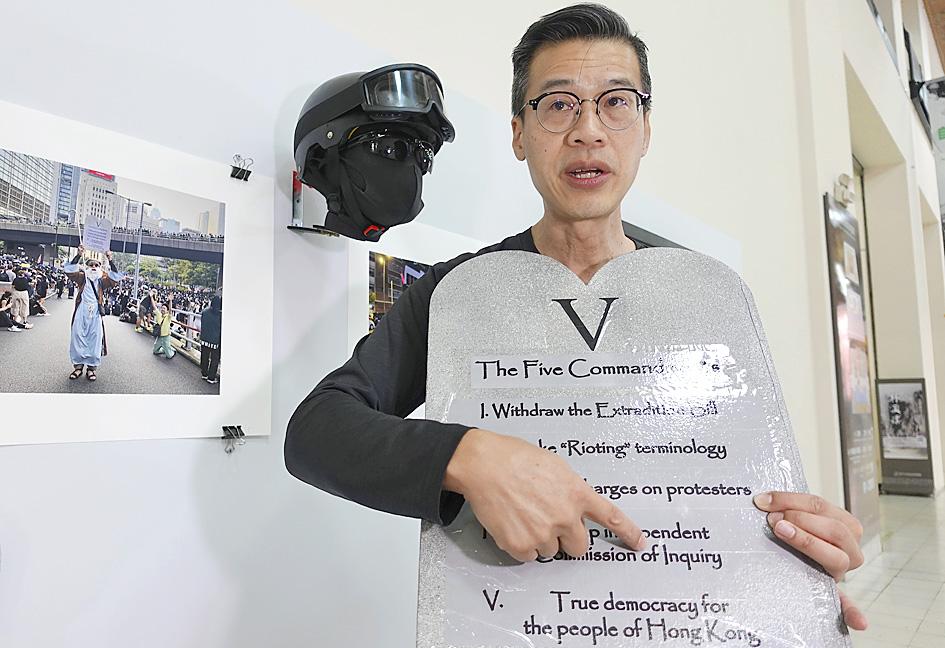For Lam Wing-kei (林榮基), a Hong Kong bookstore owner who was detained by police in China for five months for selling sensitive books about the Chinese Communist Party, coming to Taiwan was a logical step.
A nation just 640km from Hong Kong, Taiwan is close not just geographically, but also linguistically and culturally. It offers the freedoms that many Hong Kongers had grown used to before Britain returned the territory to China.
Lam reopened his bookstore in Taipei. His move in 2019 presaged a wave of emigration from Hong Kong, after tension between the territory’s Western-style liberal values and China’s authoritarian political system culminated in explosive pro-democracy protests that year.

Photo: Johnson Lai, AP
“It’s not that Hong Kong doesn’t have any democracy, it doesn’t even have any freedom,” Lam said in an interview. “When the English were ruling Hong Kong, they didn’t give us true democracy or the power to vote, but the British gave Hong Kongers a very large space to be free.”
Hong Kong and Chinese leaders are this week to mark the 25th anniversary of the territory’s return to China.
In 1997, some people were willing to give China a chance. China had promised to rule the territory under a “one country, two systems” framework for 50 years, meaning that Hong Kong would retain its own legal and political system, including freedom of speech.

Photo: Johnson Lai, AP
However, following the 2019 protests, China imposed a National Security Law that has left rights advocates and others living in fear of arrest for speaking out.
Hong Kong still looks the same. The malls are open and the skyscrapers are gleaming.
However, artist Kacey Wong (黃國才), who moved to Taiwan last year, said that he constantly worried about his own arrest or those of his friends, some of whom are now in jail.
“On the outside it’s still beautiful — the sunset viewed from the harbor — but it’s an illusion that makes you think you’re still free,” he said. “In reality you’re not. The government is watching you and secretly following you.”
Although Wong feels safe in Taiwan, life as an exile is not easy.
Despite its similarities to Hong Kong, Wong has found his new home to be an alien place. He does not speak Hoklo (also known as Taiwanese) and the laid-back nation contrasts strongly with the fast-paced financial capital that was Hong Kong.
The first six months were hard, Wong said, adding that traveling as a tourist to Taiwan is completely different than living on there in self-imposed exile.
“I haven’t established the relationship with the place, with the streets, with the people, with the language, with the shop downstairs,” he said.
Other, less prominent exiles than Wong or Lam have also had to navigate a system that does not have established laws or mechanisms for refugees and asylum seekers, and has not always been welcoming.
That issue is further complicated by Taiwan’s increasing wariness of security risks posed by China and of Beijing’s growing influence in Hong Kong.
For example, some Hong Kongers such as public school teachers and doctors have been denied permanent residency in Taiwan because they worked for the Hong Kong government, said Sky Fung, secretary-general of the Hong Kong Outlanders, a group that advocates for Hong Kongers in Taiwan.
Others struggle with the tighter requirements and slow processing of investment visas.
In the past year or so, some have chosen to leave Taiwan, citing a clearer immigration path in the UK or Canada, despite the bigger gulf in language and culture.
Wong said that Taiwan has missed a golden opportunity to keep talented people from Hong Kong.
“The policies and actions, and what the ... government is doing is not proactive enough and caused uncertainty in these people — that’s why they’re leaving,” he said.
The Mainland Affairs Council (MAC) has defended its record, saying it found that some migrants from Hong Kong hired immigration companies who took illegal methods, such as not carrying through on investments and hiring locals they had promised on paper.
“We in Taiwan also have national security needs,” MAC Deputy Minister Chiu Chui-cheng (邱垂正) said on a TV program last week. “Of course we also want to help Hong Kong. We have always supported Hong Kongers in their support for freedom, democracy and rule of law.”
About 11,000 Hong Kongers last year received residence permits in Taiwan, according to the National Immigration Agency, and 1,600 were able to get permanent residency.
The UK last year granted 97,000 applications to Hong Kong holders of British National Overseas passports in response to China’s crackdown.
However imperfect, Taiwan gives the rights advocates a chance to continue to carry out their work, even if the direct actions of the past are no longer possible.
Lam is one of five Hong Kong booksellers whose seizure by Chinese security agents in 2016 drew global concern.
He often lends his presence to protests against China, most recently attending a June 4 memorial in Taipei to mark the anniversary of the 1989 Tiananmen Square Massacre.
Similar protests in Hong Kong and Macau, until recently the only places in China allowed to commemorate the Tiananmen Square Massacre, are no longer allowed.
“As a Hong Konger, I actually haven’t stopped my resistance. I have always continued to do what I needed to do in Taiwan, and participated in my events. I have not given up fighting,” Lam said.

An essay competition jointly organized by a local writing society and a publisher affiliated with the Chinese Communist Party (CCP) might have contravened the Act Governing Relations Between the People of the Taiwan Area and the Mainland Area (臺灣地區與大陸地區人民關係條例), the Mainland Affairs Council (MAC) said on Thursday. “In this case, the partner organization is clearly an agency under the CCP’s Fujian Provincial Committee,” MAC Deputy Minister and spokesperson Liang Wen-chieh (梁文傑) said at a news briefing in Taipei. “It also involves bringing Taiwanese students to China with all-expenses-paid arrangements to attend award ceremonies and camps,” Liang said. Those two “characteristics” are typically sufficient

A magnitude 5.9 earthquake that struck about 33km off the coast of Hualien City was the "main shock" in a series of quakes in the area, with aftershocks expected over the next three days, the Central Weather Administration (CWA) said yesterday. Prior to the magnitude 5.9 quake shaking most of Taiwan at 6:53pm yesterday, six other earthquakes stronger than a magnitude of 4, starting with a magnitude 5.5 quake at 6:09pm, occurred in the area. CWA Seismological Center Director Wu Chien-fu (吳健富) confirmed that the quakes were all part of the same series and that the magnitude 5.5 temblor was

The brilliant blue waters, thick foliage and bucolic atmosphere on this seemingly idyllic archipelago deep in the Pacific Ocean belie the key role it now plays in a titanic geopolitical struggle. Palau is again on the front line as China, and the US and its allies prepare their forces in an intensifying contest for control over the Asia-Pacific region. The democratic nation of just 17,000 people hosts US-controlled airstrips and soon-to-be-completed radar installations that the US military describes as “critical” to monitoring vast swathes of water and airspace. It is also a key piece of the second island chain, a string of

The Central Weather Administration has issued a heat alert for southeastern Taiwan, warning of temperatures as high as 36°C today, while alerting some coastal areas of strong winds later in the day. Kaohsiung’s Neimen District (內門) and Pingtung County’s Neipu Township (內埔) are under an orange heat alert, which warns of temperatures as high as 36°C for three consecutive days, the CWA said, citing southwest winds. The heat would also extend to Tainan’s Nansi (楠西) and Yujing (玉井) districts, as well as Pingtung’s Gaoshu (高樹), Yanpu (鹽埔) and Majia (瑪家) townships, it said, forecasting highs of up to 36°C in those areas